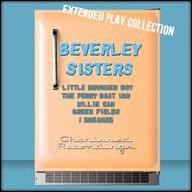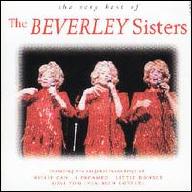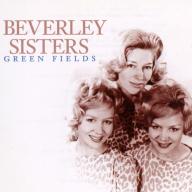Their potential was spotted immediately, as the girls sang one of the hymns they had learned at school back in Bethnal Green in perfect harmony, not unusual for such close siblings. They were offered a contract worth 15 Guineas (£15.75) ,which was more money than they had ever seen in their short lives. Ware was friendly with Cecil Madden, who was second in command at the BBC in Alexandra Palace, and they were invited to an audience at the BBC's wartime location of Bedford. It was during this first audition that the girls unexpectedly met Glenn Miller, who was recording at that time in Bedford. He was so enthralled with the young sisters that he offered them a choice of any of his musicians to make a recording with proper accompaniment. The BBC originally planned to feature the sisters on radio, and were amazed when the girls named several of Glenn Miller's bandmembers who had agreed to perform with them. In 1944, the bandmembers went to Paris to join their leader, but of course Miller never arrived, his plane crashing over the English Channel with all on board lost.
When the war was over, the BBC began broadcasting television from Alexandra Palace, and the Beverley Sisters were early hits of the new medium, always singing live -- although they retained their humble roots, with their mother making all their costumes due to the rationing of clothes that had continued long after the war. The Glenn Miller band had not forgotten them, either, and they were invited to appear live on NBC with the boys backing them. The whole family, including their parents, moved to New York, but returned to London so that the sisters could star at the Bagatelle, where they were noticed by Vic Parnell, who wanted to book them to appear at the London Palladium with Gracie Fields. However, with contracts having been signed, Fields demanded that the sisters should not appear with her, and no further explanation was ever given. The following year presented a different situation, with Danny Kaye starring at the Palladium, and he had no such qualms about appearing with a group of singing sisters. Following this success, the BBC gave the Beverley Sisters a TV show of their own, and so began the series #Three Little Girls on View, featuring the girls singing top songs of the day. The show was so successful that the following year it was renamed #Those Beverley Sisters, and ran for seven years.
Never really considering themselves a recording act and preferring to sing live in theaters, they nevertheless cut some records at Abbey Road Studios, their first hit being a harmony version of the Christmas song I Saw Mommy Kissing Santa Claus, which reached number six on the charts, barely losing out to Jimmy Boyd's cute American version. Most of their hits were released around Christmastime, with further successes including the singles Little Drummer Boy and Little Donkey and an EP that hit the separate EP charts in 1960, The Bevs for Christmas. They were in demand by advertisers and were featured singing the jingles of many a product during the 1950s. One fan of their music was English football captain Billy Wright -- Joy fell in love with Wright and they married not long after their initial meeting. Teddie also married a sportsman, Peter Felix, a British water skiing champion. While performing in Blackpool, the girls' talent was recognized by Irving Berlin, who wrote the song Sisters especially with them in mind. Although they liked the song, they were reluctant to record it at first, as they believed they would be thought arrogant singing a song about themselves. But they eventually relented and the song, although not a hit, became their signature tune.
During the 1960s and 1970s the sisters, who had five children in their families by now, only took local London bookings, preferring not to travel far from home. In the 1980s the children -- who had inherited their mothers' talent for harmony -- began singing under the stage name of the Foxes so as not to use the Beverley Sisters name. One night at the London Hippodrome nightclub where the Foxes were playing, Peter Stringfellow requested that the mums, although by then in semi-retirement, appear on stage themselves, and although this was not their sort of venue (with loud amplified music and laser light shows), they finally agreed. The reception they received was beyond their wildest imagination and led to two entirely new careers: performing for the troops overseas as a nostalgia act, and on the gay circuit as a camp act (even releasing a dance version of their song Sisters). They are still active in the 21st century, performing for the Queen as part of her Golden Jubilee celebrations in 2002. They also signed up for a ten-date tour with Max Bygraves to re-create the 1952 Royal Variety Performance in which they appeared together for the first time. They took part in the D-Day 60th anniversary memorial in 2004, and in January 2006 all three sisters were awarded MBEs in the New Year's honors list. ~ Sharon Mawer, Rovi















